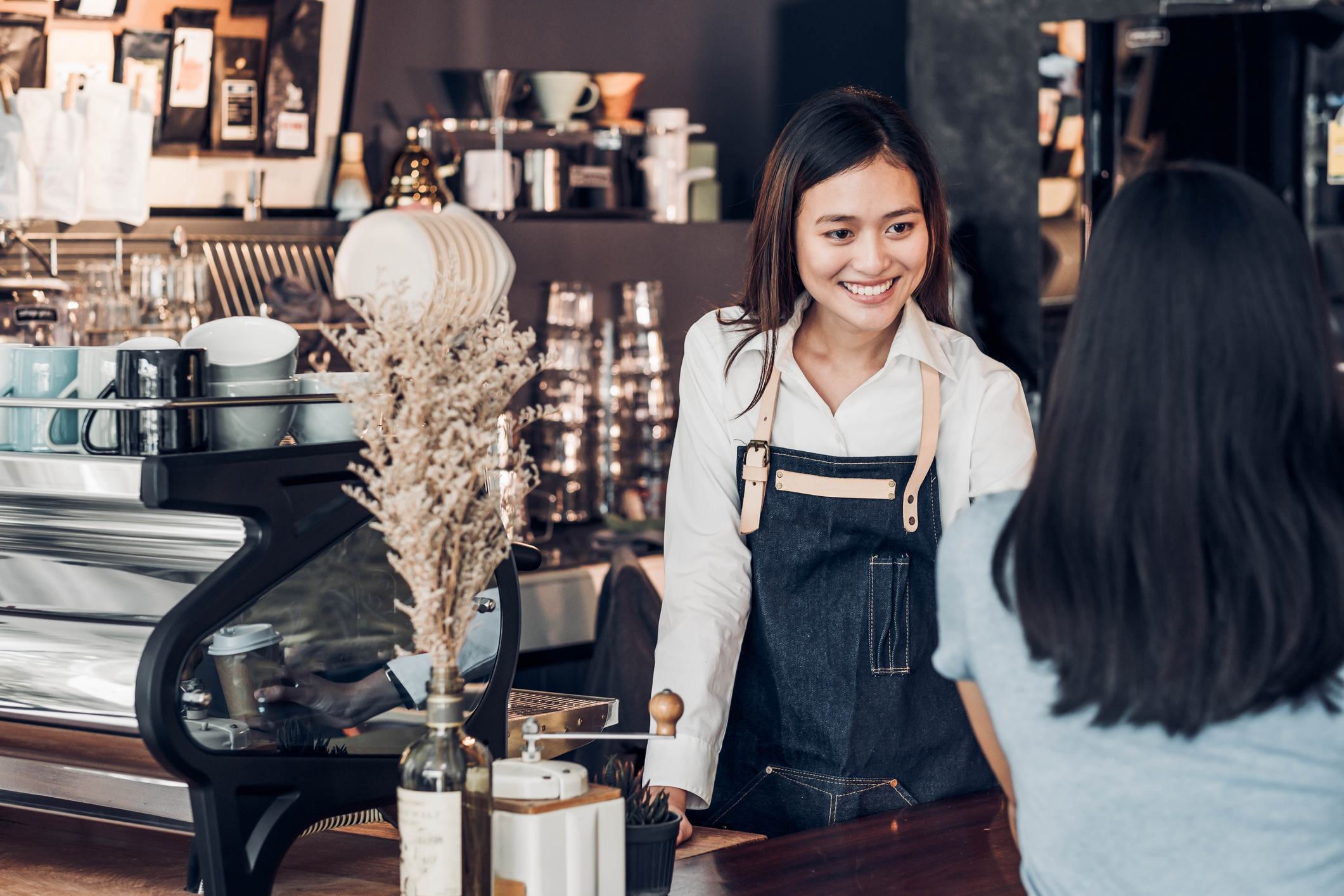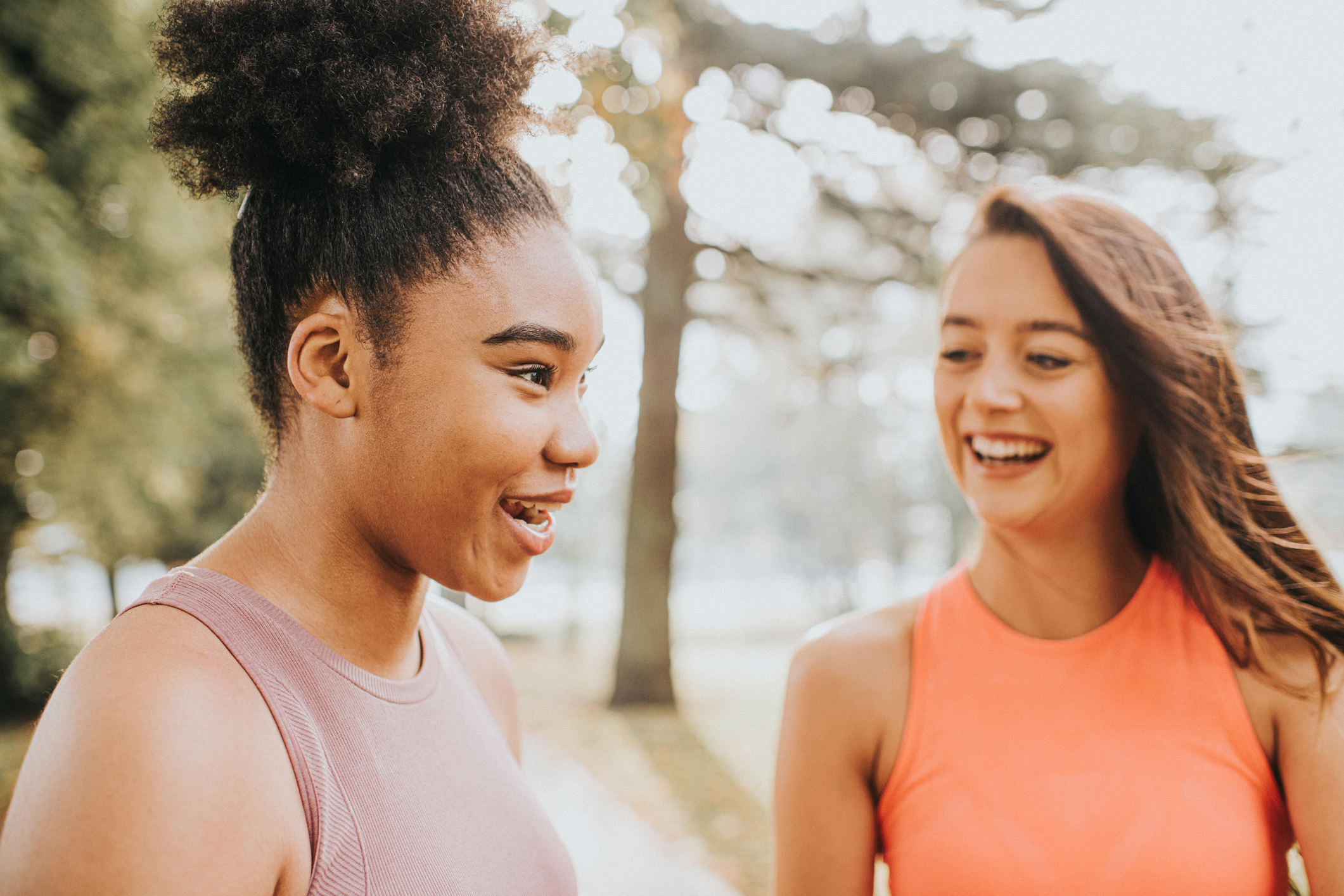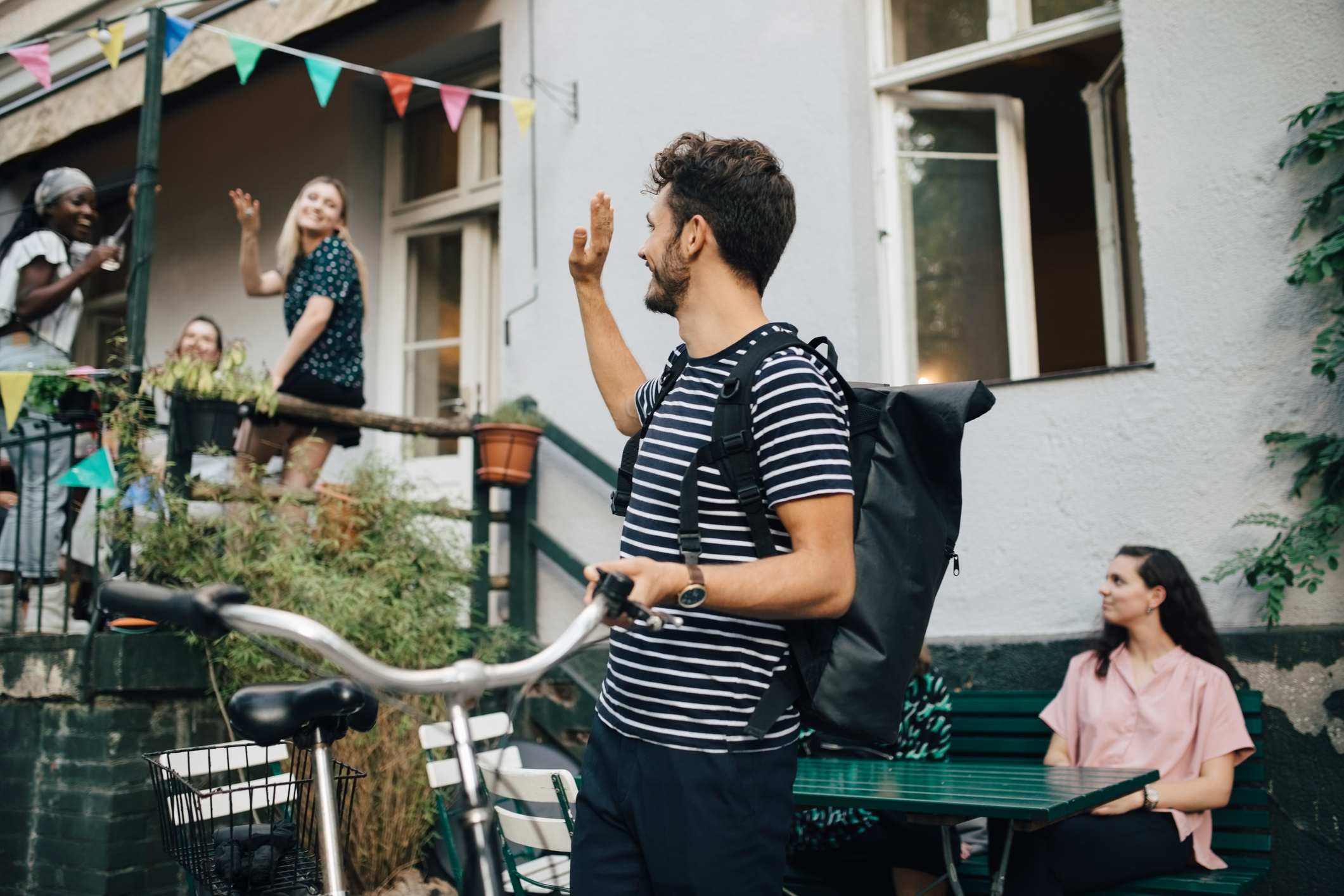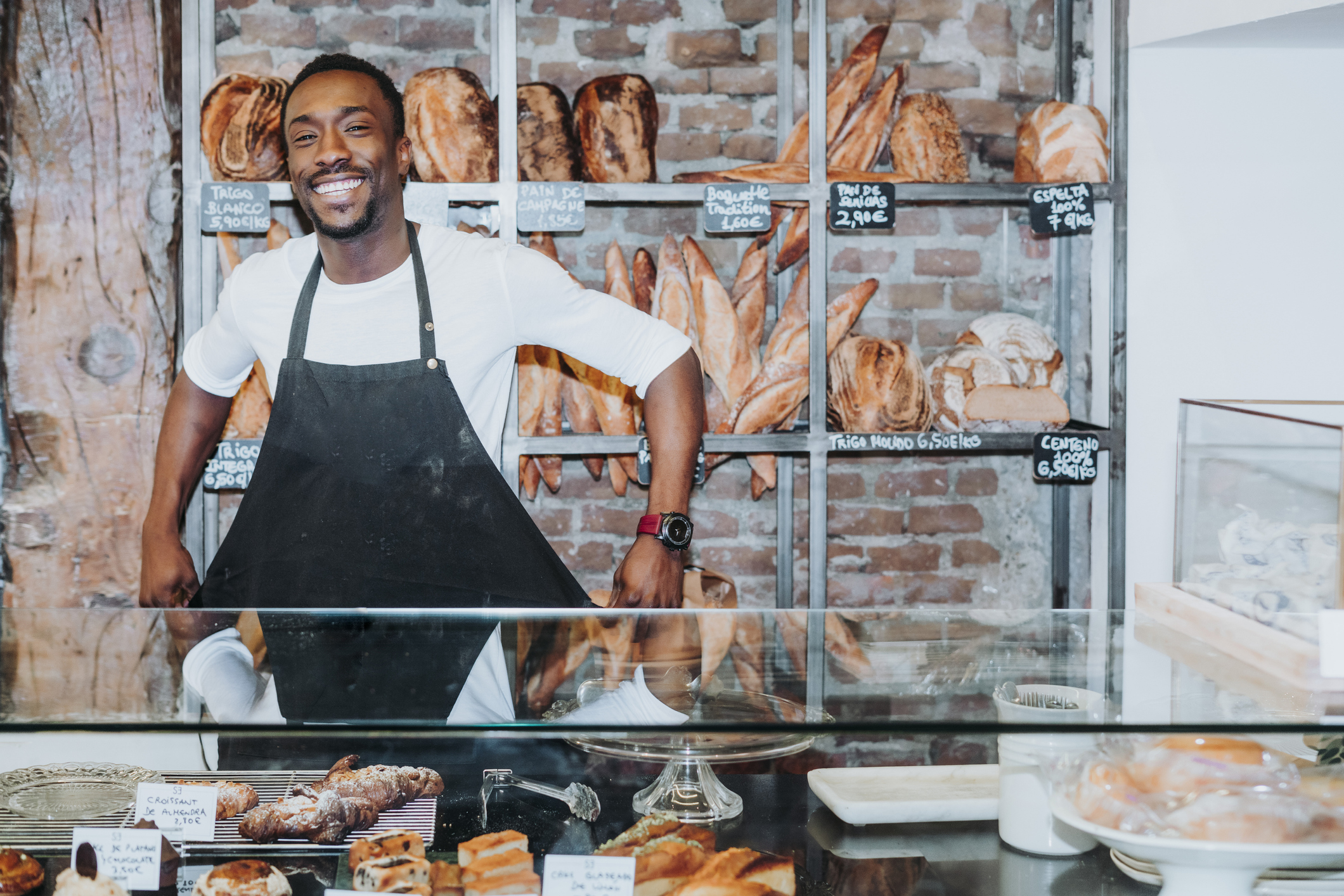
Celebrity news, beauty, fashion advice, and fascinating features, delivered straight to your inbox!
You are now subscribed
Your newsletter sign-up was successful
Turns out, casual connection is important. Let two experts help you navigate it in a COVID world
Rewind a year. You're on your way to work, running slightly late thanks to (another) misplaced key card, You've got just enough time to stop at the café on the corner and grab a flat white from your favourite barista. You don't know their name, nor will your friendship ever far extend these four walls.
And yet, the cheerful exchange brings you joy.
Sound familiar and also kind of nostalgic? It will, because in this new COVID world, those tiny, fleeting friendships have all but vanished. A friendly good morning to your bus driver is now blocked by a mask. Casual chatter in the office kitchen with a colleague you can't remember the name of can no longer happen. And getting to know a total stranger after a few drinks on a night out? Forget it.
Somehow, Zoom doesn't quite cut it, and these spontaneous day-to-day interactions are slowly fading out.
You might not think it matters, but lack of casual connection can impact your mental health as Mark Granovetter, a sociology professor at Stanford University, found in his 1974 paper The Strength of Weak Ties. It's one of the most influential sociology papers ever, because it argued that quantity of human interaction - that is, how many people you interact with in a day - is just as important as quality.

Forty years later, Canadian social psychology researcher Gillian Sandstrom found that people are happier on days when they say 'hi' to a colleague in the hallway or have a brief conversation with a neighbour at the grocery store.
Celebrity news, beauty, fashion advice, and fascinating features, delivered straight to your inbox!
Don't despair. We will return to normal, and social interaction as we know it will resume, too. But until then, for a roadmap on making casual connections in a COVID world, keep reading.
Missing weak tie friendships? Two experts share their take
What is a weak tie friendship?
First things first before we get started - what actually is a weak tie friendship? According to psychologist and therapist (MFT) Sirin Atçeken, a casual friendship encompasses just that: an informal, friendly relationship. "Think a person you know to say hi to and chat about the weather with. You might not know their name or call them an acquaintance, but you do see them daily or at least regularly," she explains.
Atçeken goes on to add that, for most, these casual connections may just brighten your day, even if only for a moment. "They’re brief, passing exchanges that can make you feel a little more human," she adds.
CEO of City Socializer and Shello Sanchita Saha agrees, adding that they're usually connections with people who you see fleetingly, "It could be the people from your Zumba class, a neighbour, your favourite barman, or other dog owners."

What's stopping weak tie friendships at current?
To state the obvious, lockdown is obviously a huge obstacle. "Weak-tie interactions happen when we are out and about, particularly when we’re taking part in an activity of some kind," shares Saha. Combine not going to work, the gym, the local coffee shop or the pub and you're missing out on hundreds of casual conversations, connections and exchanges every day.
Plus she points out that, when we do make casual conversation at the moment, it's nearly completely focused on COVID. "This means we aren’t getting the same validation or energy from them, and as a result, are learning to subconsciously avoid them," she explains.
Why, as humans, do we thrive from weak tie friendships?
In short, because we're built for them. "Humans are hard-wired for connection," explains Saha. "The experience of mutual recognition and sharing conversation with others, no matter how casual, elicits the feeling of connection and belonging. It provides social variety, too, all of which impact our general wellbeing," she shares.
Atçeken agrees, adding that what you may deem as an insignificant part of your day-to-day is really quite essential. "Micro friendships make us feel human. They humanise our experience. As social beings, we need connections - both big and small - for health and happiness," she adds.
Fun fact: did you know that making connections with people can improve your brain function? "Interactions, great and small, are constantly engaging your brain," the psychologist explains. "They can be as effective as completing a brain puzzle at developing cognitive and communicational skills, boosting memory, and releasing feel-good endorphins."
Who knew?

Why do we miss weak tie friendships when deprived of them?
Lockdown has taught us many things, but one of them being that human beings are - by and large - social creatures.
"Social interactions have so many benefits that humans actually recede mentally when we don’t have access to them," shares Atçeken.
"You need them to survive, and both your happiness and positive mental attitude depend on it. When you don’t have access to new engagement or interaction, you can experience depression, anxiety, loneliness and sadness. It’s incredibly important that we continue to generate new connections and engagements," she concludes.
5 easy ways to make casual connections in a COVID world
Disclaimer: we're not encouraging you to break current lockdown guidelines, which state you're only allowed to exercise outside of your household with one other person. (Not an outside kind of workout person? These no equipment home workouts are great, too).
Wondering how to make casual connections in a COVID world? Let the expert's suggestions help.
- Say hi to your postman. Always make an effort to engage with your Amazon delivery guy. Show your appreciation.
- Engage via social media. If you're on Facebook, Instagram, Twitter or another social platform, why not share a short post or reply to a comment? You might make someone’s day.
- Check in on friends via text. Sure, you know your contacts, but these interactions will boost your mental wellbeing.
- Make light conversation. Why not try engage with the people on the end of your utilities calls, such as banks, phone companies, or the gas company? They’re working to help you, so a friendly check in will probably mean a lot.
- Smile, smile, smile. Sounds simple, helps a lot. Try smiling at your neighbours, local community members, or just strangers in the park. It doesn't matter if they can't see because of your mask. It'll make you feel good.
"I've loved lockdown - apart from the total loss of casual friendships."
Natalie Trice, a coach and mentor, hasn't actually found the lockdowns too difficult. What she has found hard is the loss of casual day-to-day friendships and community spirit, too.
"As a self-confessed introvert, I have actually loved lockdown one, two, and three. I'm really lucky to live in Devon by the sea and I have my own business with an office at home, so we've been lucky in that regard. Not having to get on the train to London a couple of times a month, or do the school run has been bliss."
"As time has gone on, what I miss the most is taking my laptop to a beachside cafe and working with the buzz of the coffee machine and interactions with the staff and customers. Over the years, they became my friends. When I moved to Devon five years ago, The Clipper cafe was an integral part of our move and I miss that place so much."
"Yes, we can get takeaway coffee and cake, but it's not the same as sitting inside at your own table and the waiting staff knowing what you want before you order. You know, feeling like you're part of the fabric of the place. I miss it so much. I know most are waiting to go back to the pub, but all I want is to go back to my favourite cafe - The Clipper - to see my coffee buddies and write my next book in a place that feels like home."
If you're feeling consistently lonely, do read the resources on the Mind website and remember - you are not alone.

Ally is Marie Claire UK's Senior Health and Sustainability Editor, a well-regarded wellness expert, ten-time marathoner, and Boston Qualifying runner.
Utilising her impressive skillset and exceptional quality of writing, she pens investigative, review and first-person pieces that consistently demonstrate flair and originality.
As well as writing, Ally manages a team of freelancers, oversees all commissioning and strategy for her pillars, and spearheads the brand's annual Women in Sport covers, interviewing and shooting the likes of Mary Earps, Millie Bright, and Ilona Maher. Shortlisted for three BSMEs and winning one in 2022, Ally lives and breathes her verticals: her eye for a story and connections within the wellness sphere are unrivalled. Follow Ally on Instagram for more.
